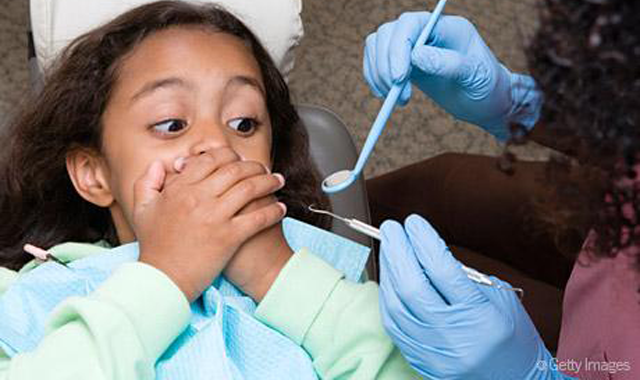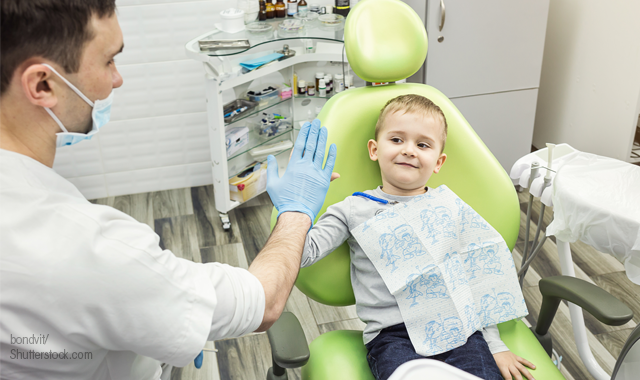5 ways for hygienists to deal with parents of patients
Are you having more trouble dealing with parents than you are your young patients? Check out these tips.
One of the best - and sometimes hardest - parts of our job as dental hygienists is working with individual patients and addressing their needs, concerns, fears and desired outcomes. When working with children, we also have to consider the parents of our patients and include them in the dental visit. There’s definitely a gentle balance (that can be learned over time) between the needs of the patient and the expectations of the parents.

As a dental hygienist, I’ve spent my career in the community health setting. I currently work in a school-based sealant program within a federally qualified health center (FQHC). One of the best parts of my job is that I’m able to work directly with students in the schools, but I also get the opportunity to work with their families in our dental clinics. I’ve seen children and their parents interact in many different situations, and now, as a parent myself, I have new perspectives on dental care for pediatric patients.
Read more: The top 5 pediatric dental trends of 2018
While some of the same techniques may work for adult patients and child patients, there are certainly some different strategies worth pointing out.
Click through the slides to find out five ways to deal with parents in the dental office.


1. Acknowledge the fears and concerns of the parent
I’ve been in many situations with patients where the fears of the parent and/or sibling have been projected onto the patient. Very young patients come in to their first dental appointment and have already been exposed to dental fears from people they love very much. While I’d prefer these fears to not be pre-emptively shared with young children, the reality is that many people have had bad dental experiences and carry that fear with them daily.
Read more: 10 ways to simplify pediatric dentistry
As a clinician, I think it’s necessary to discuss these past experiences with the parents and understand where they’re coming from. Ideally this conversation could take place separate from the child in a consultation setting. The parent’s experiences may be valid and may shape the treatment they want to consider for their child as well as the procedures they are (or aren’t) willing to consider. Brushing off these concerns won’t help us build a relationship with the patient and may hinder us from accomplishing the ideal outcomes for the patient. The most beneficial thing for everyone involved is to try to understand the fears and concerns of the parent, address them directly, and help the parent understand how to have appropriate conversations with his or her child without passing down his or her own fears.



2. Set expectations early
Understanding the concerns of parents can give us a starting point for a conversation about our dental office and how we treat patients. It’s important for any dental office to be clear with the patients (and parents) about treatment philosophies, scheduling guidelines and financial policies. While this seems pretty obvious, all of these things are very important in having an easy and successful appointment. Both the patient and the parent need to know that the office is a good fit for them in order for them to feel confident in the treatment we’re providing. Establishing this relationship early avoids stressful and emotional situations down the road.
Trending research: Is doxycycline safe for use in children?
Another expectation that should definitely be set from the beginning is the appointment flow, language to be used, and role of the parent in the dental visit. Pediatric dentistry has come a long way over the past 40 years and likely isn’t going to be anything similar to what the parents remember from their childhood. If your office uses more “child-friendly” language like “sugar bugs,” “spaceship chair,” “sleepy juice,” etc., let the parents know that from your first meeting with them. Parents can play an active role in preparing the child for his or her appointments, especially if they can use the same language you’ll be using when you see the child for future visits.
Explaining your office’s feelings on parents in the treatment rooms, siblings’ accompaniment and time line works best at an initial visit too. Waiting until the day of treatment, when emotions and stress are already running high, is an inopportune time to spring a new “rule” on a parent. Parents, like the patients, are probably anticipating the first treatment visit for weeks. The clearer we can be about what that appointment will look like, the more smoothly it will go for everyone. If your feelings on these issues are flexible, then have these conversations anyway so that you can create a plan together.



3. Remove the guilt
Recently we found out that my 3-year-old son needed glasses. We had identified a “droopy” eyelid when he was only days old, and he has been seeing a pediatric ophthalmologist since he was about two weeks old. When we found out in February that he needed to wear glasses, we had SO MANY questions. We wanted to learn everything and do anything we could to help him see better. The thought that our child couldn’t see well, and that it may have been affecting him his whole life, was devastating. The most comforting part of the process was that there was nothing we could’ve done differently and no way we could’ve prevented him from needing glasses.
Related reading: How to ACTUALLY get kids to brush their teeth
The need for dental care is different. For years we’ve preached that though early childhood caries is the No. 1 most chronic childhood disease, yet it’s nearly 100 percent preventable. As dental professionals, we see this as a great thing - preventable means that we can actually impact the prevalence of the disease. However, to parents, it sounds like you're telling them that they could’ve prevented this from happening ... but didn't. There’s so much personal guilt associated with the diagnosis of decay in our children. I’ve seen this fear in many of my dental professional/parent friends. We dread the day our child is diagnosed with decay because after all, we're dental professionals and should’ve been able to prevent this from happening.
The reality is, as we all know, caries is multi-faceted. There are many things that can impact the occurrence and progression of decay. While diet and home care play a huge role in the caries process, so do pH of saliva, dry mouth from airway obstruction and sleep issues, and to some extent genetics (though we don't want to always acknowledge it). Regardless, it’s imperative that we, as clinicians, try to look at the big picture. Guilt is sometimes a great temporary motivator but rarely affects long-term change. The changes we want to see happen for our patients and their families are lifelong habits that need to be motivated by something bigger than temporary guilt. We need to keep pointing our patients toward optimal overall health and discussing the role of all systems in their oral health. Beginning the conversations about oral health and its impact on our whole health with expecting parents and evolving the conversation over the lifespan of our patients removes the “lecture and guilt” scenario that we (and our patients) are all too familiar with.



4. Be patient
Parents mean well. They really do. We have to remember that parents are trying to do the best for their children. Many of us, including myself, find it so much easier to be patient with our pediatric patients than to be patient with their parents. We’ll spend hours a day modeling “show, tell, do” for kids, but the second the parent tries to ask a question or step in to “help,” we get defensive and irritated. Don't forget that the parents are just as new to this situation as the kid is. Just because the parent has been a dental patient himself or herself doesn’t mean that he or she knows how to play the parent role in the dental office. I’ve even found myself stumbling to fit into this role when I take my kids in for their dental visits. I’m so used to being the clinician and walking them through it that I forget to take a step back and let their dental team carry them through the appointment.
Trending article: Are you suffering from burnout?
Circle back to points No. 1 and No. 2 and realize that any misguided involvement (or lack thereof) on the part of the parents is most likely due to their own past experiences. If you haven't set the parents up for success by explaining what’s expected in this situation, then how can you expect them to succeed? Even though we see 30 or more children in a day, this is the one appointment this family has. We know what to expect and what it should look like in an ideal world - most of the time they don't.
Whatever “type” of parent happens to be in your office today, give him or her the benefit of the doubt.



5. Refocus the attention to the child
It’s often easy for both parents and clinicians to get wrapped up in their own needs and forget that the focus of the visit is the child. It’s definitely okay to take a moment and point that out to both the parent or other team members. In cases where the parent is actually interfering with the visit, feel free to pull him or her aside and have a talk. Obviously you can do this in a professional manner, but it’s okay to remind him or her of the expectations that were already laid out and explain to him or her what needs to happen for you to have the best outcome. We all know that it’s easier when the parent isn't in the room, but the reality is that it’s not always possible to remove parents from their child's visit (nor do we always need to). To parents, this seems so counterintuitive that the best thing for their child would be for them to be absent. However, when explained well, many parents will come to realize the benefits and will learn to feel comfortable with you and your office and be willing to empower their children to conquer their dental visits independently. After all, it's about the child and what’s best for him or her.
Trending research: Is staying hydrated destroying children's teeth?
At the end of the day, the goal for everyone is that the child receives the best treatment possible and leaves having a positive experience. All the stress about schedules, problems with equipment, parent dynamics, etc. have to be put aside and the patient still has to receive your best. You’re setting the tone for this patient's dental future and potentially affecting his or her future parenting perspective on dental care. Keeping our focus on the child not only makes him or her feel cared for but also keeps us in the right mind to do our best at the job we've been trained to do. You're an EXPERT at your job and your patient should have the utmost confidence in your skill and desire to be that expert for him or her in that moment. Do whatever you need to do to remind yourself of this with every patient.

Floss & Flip Flops Episode 14: Children's Dental Health Month with Irene Iancu
February 1st 2023The Sanders Sisters invite Irene Iancu, RDH onto the microphone to discuss Children's Dental Health Month, discussing the importance of prevention, counseling and patient-centered care for our pediatric patient population.
Floss and Flip Flops Episode 13: The Focal Point of Infection
January 10th 2023The Sanders Sisters jump into 2023 with a discussion of the many conditions that display some of their earliest symptoms in the oral environment, and all the ways this can connect to systemic issues that can become serious health challenges for patients.